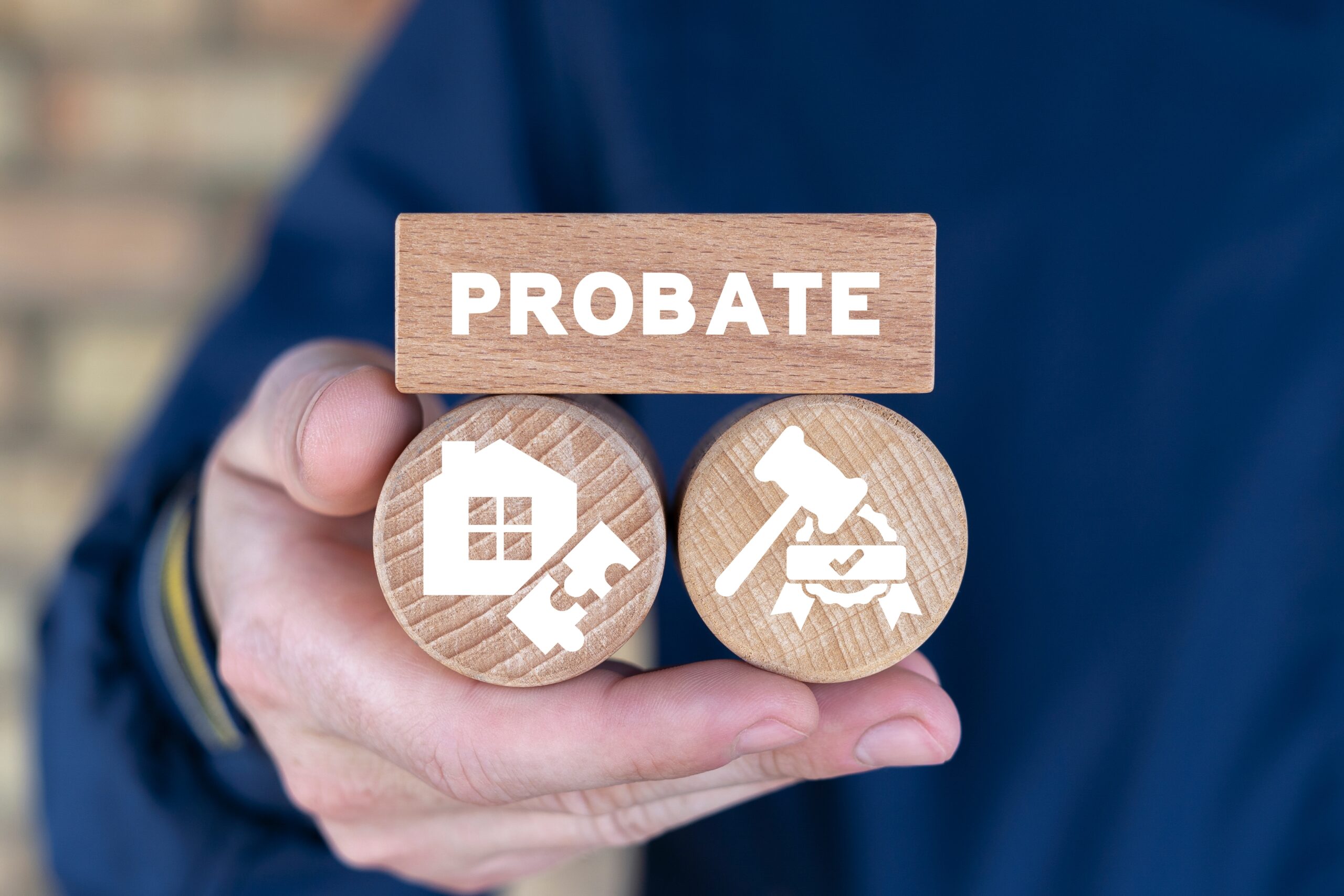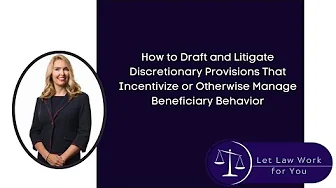Our blogs and videos are designed to give you valuable insight into estate planning, probate, asset protection, and more. Read our attorneys’ latest updates and stay informed.
Blogs
-
-
Gray Divorce and Estate Planning
Jan 24, 2024 -
Avoiding Probate on Bank Accounts
Jan 13, 2024
FAQs
What If there is no will?
If there is no will, the estate will have to go through the probate process as it would with a will. However, two significant differences apply to the probate administration process when there is no will.
First, the probate court will appoint an administrator as the first step. The court may appoint a family member, but the court can appoint any person other than a family member. The person selected for distributing the estate’s assets may not have been the decedent’s choice.
Second, the distribution of the assets will be determined by what is called the intestate law because the decedent has named no heirs. This means that the assets may be distributed to persons that would not have been chosen to receive them. The heirs are determined by Law of Succession. The court will require proof of the identification of the heirs that would be covered by the law before any distributions making any distribution of assets. The list of heirs covered under the law is extensive, which means that the court will reach to extended family members.
Who would inherit the assets under the intestate laws?
If the decedent was married or had a registered domestic partner, the court will need to understand what assets are community assets, or marital assets, and which assets are held solely by the decedent. If assets are held jointly or with rights of survivorship, then the transfer to the surviving spouse or the registered domestic partner is automatic.
The Law of Succession, which controls asset distribution when there is no will, stipulates that community, or certain marital assets, will go directly to the registered domestic partner or spouse if the decedent did not have children or close relatives. The law prevents the separate assets from being given in total to the registered partner or spouse. If there is not a registered domestic partner or spouse, the law specifies an order of distribution of all separate assets among any children and certain close relatives.
A surviving spouse with children will inherit all of the community assets and 1/2 or 1/3 of the decedent’s separate assets, and the children will inherit 1/2 or 1/3 of the separate assets. The spouse will inherit all of the community property and 1/2 of the separate assets with the remaining 1/2 passing to the decedent’s parents if there are no children.
What are the assets that must be probated?
Here is a list of assets that must be probated:
– Assets held only in the decedent’s name.
– Assets that are not registered with the decedent’s domestic partner or not held with a spouse as community property.
– That portion of any asset owned by the decedent that was also owned or held as tenant in common with other persons.
Here is a list of assets that are excluded from the probate process:
– Assets held in joint tenancy
– Assets held in a living trust
– Assets with a named beneficiary such as life insurance and IRAs
– Assets registered by a married couple as community property with rights of survivorship.
What can I expect during the probate process?
The executor must file a document called the “Petition for Probate” with the court having jurisdiction where the decedent lived. The petition includes details about the decedent, about the executor, and information about the heirs. The size of the estate must also be included along with a statement about whether a surety bond is required or waived by the will. The heirs must be given a formal notice that the probate process has been started. If there is a will, then it must be proven to be valid, and this requirement is usually satisfied by having the witnesses to the will signing providing a sworn statement which is submitted to the court.
The court will then issue “Letters of Testamentary” or “Letters of Administration” which appoints an executor or an administrator and grants this person authority over the assets of the estate. This authority stipulates that the person appointed also has responsibility to keep the assets safe, keep real estate property insured and maintained, and heirlooms safeguarded. The executor will begin an accounting of the assets and compile a complete inventory and appraisal of each asset for filing with the court. The total value of the assets will need to be determined and filed with the court along with the inventory. The executor must pay outstanding debts and ensure that all tax returns are filed.
Some assets may be liquidated by the executor to pay debts and taxes. The state law allows the executor to handle most matters without first obtaining permission from the court. Some actions such as selling real estate require prior court approval. If the heirs include siblings of the decedent, then their approval must be obtained before the real estate can be sold. When all debts and taxes have been paid and the assets have been converted into cash or some other form of transferable assets, then the executor will ask the court to close the estate. A final accounting must be made to the court before the assets are transferred.
What are estate taxes?
In order to understand estate taxes, it is important to know that California does not have an estate tax. Estates in California are subject only to the federal estate tax, but only 2 out every 1,000 estates owe any federal estate tax. Two reasons account for this low number of estates. First, there is a high exemption amount. Secondly, many people have taken advantage of the legal loopholes, and their estates are taxed on average about 16% of the net estate value and not the highest tax of 40%. This article will provide an overview of these points, and our office would be pleased to discuss this matter with you.
Estate Tax Calculation
The estate tax calculation begins with the amount of the gross estate. The gross estate includes the fair market value of all property owned by the decedent and property they had an interest in. Proceeds from life insurance owned and controlled by the decedent are included as are annuity proceeds. Some exceptions do exist. For example, if securities owned by the decedent were purchased with taxable income, then only the increase in the value of securities is taxable. This also applies to the appreciation of the value of art work and real estate.
The Net Estate Value
The net estate value is calculated by subtracting several deductions from the gross estate value and after the allowed exemptions have been taken. The deductions include end-of-life expenses, funeral expenses, outstanding debts, the fair market value of property to be donated after death. The value of property that transfers to the spouse by the automatic rights of survivorship is also deducted.
Exclusions From Calculating The Net Estate Value
After the net value of the estate has been calculated, the value of lifetime charitable gifts made to people and organizations, except to qualified tax-exempt organizations, that exceeded the annual exclusion for every year since 1977 must be added to the value of the estate to arrive at the net taxable value. These are the annual gift exclusions for tax purposes. However, there are other charitable gift exclusions that our office would be pleased to discuss with you.
The personal exemption level of $5.43 million is excluded from the remaining net fair market net value of the estate. This exclusion applies to anyone who inherits the assets of the estate. However, it usually applies to one person, but it will apply to each spouse who jointly inherit an estate.
The exemption per person in 2020 is $11,580,000 which will revert to $5,000,000 per person in 2026 if no additional legislative action occurs.
A surviving spouse is entitled to the marital deduction which means that property inherited passes free of any estate tax. This deduction is not available to noncitizen spouses, but noncitizen spouse can use the personal exemption. The surviving spouse is also entitled to the personal exemption.
Special estate tax rules may apply to family business and businesses jointly owned with persons other than a spouse. Farms are may also be subject to special rules.
Testimonials
Charities We Support
We dedicate pro bono time, volunteer services, and a percentage of our gross revenue to these organizations. In 2023, we sponsored a refugee family of five to come to the United States and start a new life.
Each year our law firm decides as a group which charities to assist with our time, money, and expertise. Please feel free to click on any of the charities below and make a donation of your own.























